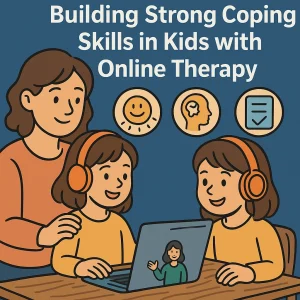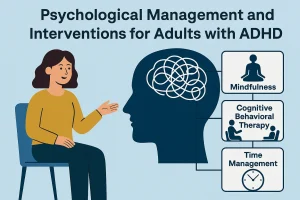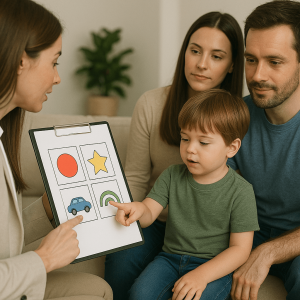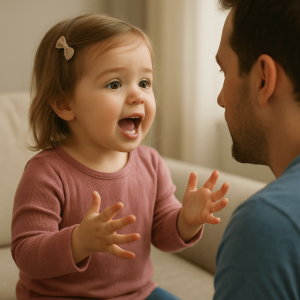Emotional Regulation in Kids: Stages & How to Help
Last Updated: September 5, 2024
Emotional regulation forms the cornerstone of a child’s social and emotional development, serving as more than just a means to curb outbursts or soothe frustrations. It is, in essence, the art of navigating complex emotional landscapes, crucial for fostering healthy relationships, academic achievements, and a balanced psychological state. By delving into why certain children face more significant challenges in this area and pinpointing pivotal developmental milestones, we can offer tailored support that resonates through their entire growth trajectory. From the toddler who flings toys in vexation to the adolescent who retreats into silence, understanding the intricate ‘why’ and ‘when’ of their emotions empowers us to steer them towards more constructive expressions and resilient coping mechanisms.
Understanding Emotional Regulation
Emotional regulation refers to how we manage and respond to our emotions and how we can express these emotions in socially appropriate ways. For children, this skill is crucial as it not only shapes their immediate reactions but also has long-term implications on their social interactions and mental health.
In the simplest terms, emotional regulation involves being aware of one’s emotional state, using strategies to control intense emotions when necessary, and adjusting one’s emotional responses in a way that fits the situation. For a child, this could mean taking deep breaths instead of having a meltdown, or finding words to express frustration rather than acting out physically.
Read More: Emotional Regulation for Kids: Easy Tips and Activities
Why is this important for children?
As children develop, their ability to regulate their emotions significantly impacts their learning, relationships, and overall well-being. Effective emotional regulation skills are linked to greater academic achievements, healthier social relationships, and a lower likelihood of developing mental health disorders. Children who learn to manage their feelings effectively are also better at adapting to change, overcoming challenges, and navigating the complexities of growing up.
Causes of Emotional Dysregulation in Kids
Emotional dysregulation in children can stem from a complex interplay of various factors. Understanding these causes can help caregivers and educators provide better support and interventions.
1. Genetic Factors and Temperament:
Just as physical traits are passed down through generations, so too are aspects of our emotional world. Some children are naturally more sensitive to emotional stimuli; they might react more intensely or take longer to calm down compared to their peers. This temperament is often rooted in genetics, making it a fundamental part of who a child is from the very beginning.
2. Environmental Influences:
The settings in which a child grows up play a significant role in shaping their emotional responses. A stable, supportive family environment can foster good emotional regulation, whereas high conflict or instability can lead to difficulties. Similarly, experiences at school and with peers—such as bullying or strong friendships—also influence emotional development. The key is the nature of interactions children have with the people around them.
3. Mental Health Issues and Developmental Disorders:
Conditions like ADHD, autism spectrum disorder, and anxiety can directly impact how a child regulates their emotions. For example, children with ADHD may struggle with impulsivity, making it hard for them to pause and choose how to react emotionally. Understanding these conditions is crucial for providing appropriate support and strategies to help these children manage their emotional responses more effectively.
4. Physical Health and Nutrition:
It might be surprising to learn that a child’s diet and physical health can affect their emotional regulation. Nutritional imbalances, lack of sleep, or chronic physical health issues can all make emotional control more challenging. Healthy body, healthy mind isn’t just a saying; it’s deeply rooted in how well a child can handle emotional ups and downs.
5. Traumatic Experiences:
Early life stress, such as experiencing or witnessing trauma, can profoundly affect a child’s ability to regulate emotions. Trauma can lead to heightened emotional responses and difficulty calming down. Supportive, trauma-informed care is essential in helping these children learn to manage their emotions.
6. Media Exposure and Technology Use:
In today’s digital age, the amount and type of screen time can also influence emotional regulation. Excessive exposure to inappropriate content or violent media can increase emotional dysregulation. It’s important for parents to monitor and guide their children’s media use to ensure it supports healthy emotional development.
Developmental Stages of Emotional Regulation
Understanding how children develop the ability to regulate their emotions is crucial for supporting their growth at every stage. Let’s explore the developmental journey of emotional regulation from infancy through adolescence.
1. Infancy (birth to 2 years):
The earliest stage of emotional development is all about responding to the world. Infants initially react to discomfort, hunger, or fear with crying as their primary means of communication. Over time, they start to develop a basic sense of trust and security, especially through consistent and nurturing care from their parents or caregivers. This foundation is crucial as it sets the stage for more complex emotional regulation skills.
2. Early Childhood (2 to 6 years):
As toddlers grow into preschoolers, they begin to learn basic strategies to cope with their emotions. This stage is marked by significant milestones such as the ability to use words to express feelings instead of acting out physically. However, their skills are still rudimentary, and they often need considerable guidance from adults to manage their emotions effectively.
3. Middle Childhood (6 to 12 years):
School-age children make considerable strides in emotional regulation. They start to understand the norms of emotional expression and are increasingly able to adjust their emotions to fit different social situations. For example, they learn that it might be okay to show anger or frustration in some settings, like at home, but not in others, like in the classroom.
4. Adolescence (12 years and up):
Adolescents continue to refine their emotional regulation skills. This stage is characterized by an increased capacity for managing complex emotional experiences and for understanding the emotions of others, known as empathy. Teenagers are better able to delay gratification and suppress inappropriate emotional responses, skills that are vital for adult functioning.
Emotional Regulation Strategies by Age
| Age Range | Strategies | Expected Outcomes |
|---|---|---|
| Infancy (0-2 years) | – Responding quickly to cries – Consistent routines for sleep and feeding – Cuddling, rocking, and soothing touches | – Develops secure attachment with caregivers – Begins to trust the environment and people around them |
| Early Childhood (2-6 years) | – Teaching basic emotion words like “happy,” “sad,” “angry” – Role-playing games to express feelings – Encouraging talking about emotions instead of acting out | – Improved ability to verbalize emotions – Better emotional understanding and empathy – Reduces tantrums and physical expressions of frustration |
| Middle Childhood (6-12 years) | – Teaching problem-solving skills – Discussing consequences of actions – Role-playing complex social scenarios | – Better management of emotions in social settings – Increased ability to navigate conflicts – Enhanced cooperation with peers |
| Adolescence (12+ years) | – Advanced coping mechanisms like journaling, meditation, or talking to peers/adults – Discussing future consequences of current emotions – Encouraging participation in sports or arts for emotional expression | – Enhanced self-awareness and identity formation – Improved resilience against stress – Better long-term emotional and mental health management |
Challenges in Fostering Emotional Regulation
While the journey to emotional maturity is a natural part of growing up, it’s not without its bumps. Understanding the common challenges and recognizing the signs of emotional dysregulation can help parents and educators provide more targeted support.
Common Issues at Different Developmental Stages:
- Infancy and Toddler Years: At this stage, children are just beginning to learn about their emotions. Common issues include frequent tantrums and difficulty calming down. These behaviors are often due to the child’s limited language skills, which make it hard for them to express their needs or frustrations.
- Early Childhood: As children enter preschool age, challenges often relate to sharing, taking turns, and other social skills involving emotional control. They may struggle with aggressive responses or become overly upset when things don’t go their way.
- Middle Childhood: School-aged children can experience issues related to increased academic and social expectations. Challenges such as handling criticism, dealing with peer rejection, or managing anxiety over school performance are common.
- Adolescence: Teenagers face the task of navigating more complex social situations and greater emotional turmoil. Issues during this stage can include mood swings, impulsivity, and experimenting with risky behaviors as forms of emotional expression or regulation.
Recognizing Signs of Emotional Dysregulation:
Identifying when a child is struggling with emotional regulation is key to intervening effectively. Signs to look out for include:
- Excessive Outbursts: Frequent tantrums or explosions over minor issues can be a red flag.
- Withdrawal: On the other end of the spectrum, some children might withdraw or suppress their emotions excessively.
- Difficulty Recovering: After being upset, struggling to calm down or return to a baseline emotional state can indicate regulation issues.
- Social Challenges: Ongoing problems in making or keeping friends, or repeated conflicts with peers or adults, may also signal difficulties with emotional regulation.
Conclusion
Understanding emotional regulation is crucial for helping children grow into well-balanced adults. We’ve learned that many factors, like family environment, health, and even media use, can affect how children handle their feelings. By keeping up with new research and strategies in child psychology, parents and educators can provide the best support for their children’s emotional development.
At Wellness Hub, we are dedicated to this mission. We encourage everyone involved in caring for children to stay proactive in creating positive environments for their emotional growth. Your commitment helps build a community where children can thrive emotionally and socially. Thank you for your dedication to nurturing the next generation.
Frequently Asked Questions:
1. What is emotional regulation in children?
Emotional regulation refers to a child’s ability to manage and respond to their emotions in a socially appropriate way. It involves understanding and controlling emotional reactions to cope with different situations effectively.
2. Why is emotional regulation important for children?
Emotional regulation is crucial for children as it impacts their social interactions, academic performance, and overall mental health. Kids who can regulate their emotions are better at handling stress, forming relationships, and achieving personal goals.
3. At what age should parents start teaching emotional regulation?
Parents can start teaching emotional regulation from infancy by responding consistently to a child’s needs, which helps them feel secure and understood. As children grow, parents can teach more complex strategies like identifying emotions, discussing feelings, and practicing calming techniques.
4. How can schools support emotional regulation in students?
Schools can support emotional regulation by integrating social-emotional learning (SEL) programs that teach empathy, resilience, and emotional awareness. Teachers can also create a supportive classroom environment where students feel safe to express their emotions and learn coping mechanisms.
5. What are some signs of emotional dysregulation in kids?
Signs of emotional dysregulation in kids include frequent tantrums, extreme irritability, sudden emotional outbursts, or excessive withdrawal in challenging situations. These signs might indicate a child is struggling with managing their emotions effectively.
6. Can poor emotional regulation affect a child’s academic performance?
Yes, poor emotional regulation can significantly impact a child’s academic performance. Difficulty in managing emotions can lead to problems with concentration, memory, and social interactions, which are all critical for learning and academic success.
7. What role does diet and physical health play in emotional regulation?
Diet and physical health have a substantial impact on emotional regulation. Nutritional deficiencies, lack of sleep, or inadequate physical activity can all contribute to emotional instability, affecting a child’s ability to manage their feelings effectively.
8. How do traumatic experiences affect a child’s ability to regulate emotions?
Traumatic experiences can severely disrupt a child’s emotional regulation. Children who have experienced trauma may have heightened emotional reactions and find it more challenging to calm down, requiring specialized support and therapeutic interventions to help them cope.
9. What strategies can parents use to help their children develop better emotional regulation?
Parents can help their children develop better emotional regulation by modeling calm behavior, discussing emotions openly, practicing mindfulness techniques together, and establishing routines that provide stability and security for their child.
10. Where can I find more resources on emotional regulation for kids?
For more resources on emotional regulation, you can visit educational websites, consult child psychologists, or check out social-emotional learning tools online. Wellness Hub also offers articles and guidance on supporting emotional development in children.
About Author:
Lasya Vooturi,
Clinical Psychologist (A) & Behavioral Therapist
Lasya holds a Professional Diploma in Clinical Psychology from Amity University, where she deepened her understanding of psychological principles from March 2023 to March 2024. With over a year of dedicated experience as a Behavioral Therapist, Lasya has honed her skills in applying effective therapy techniques tailored to individual needs. Fluent in Telugu, Hindi, and English, she is adept at connecting with a diverse range of clients, ensuring comprehensive communication and understanding. Lasya’s approach is grounded in empathy and scientific rigor, making her a trusted ally in navigating mental health challenges.
Book your Free Consultation Today
Parent/Caregiver Info:
Client’s Details:
* Error Message









